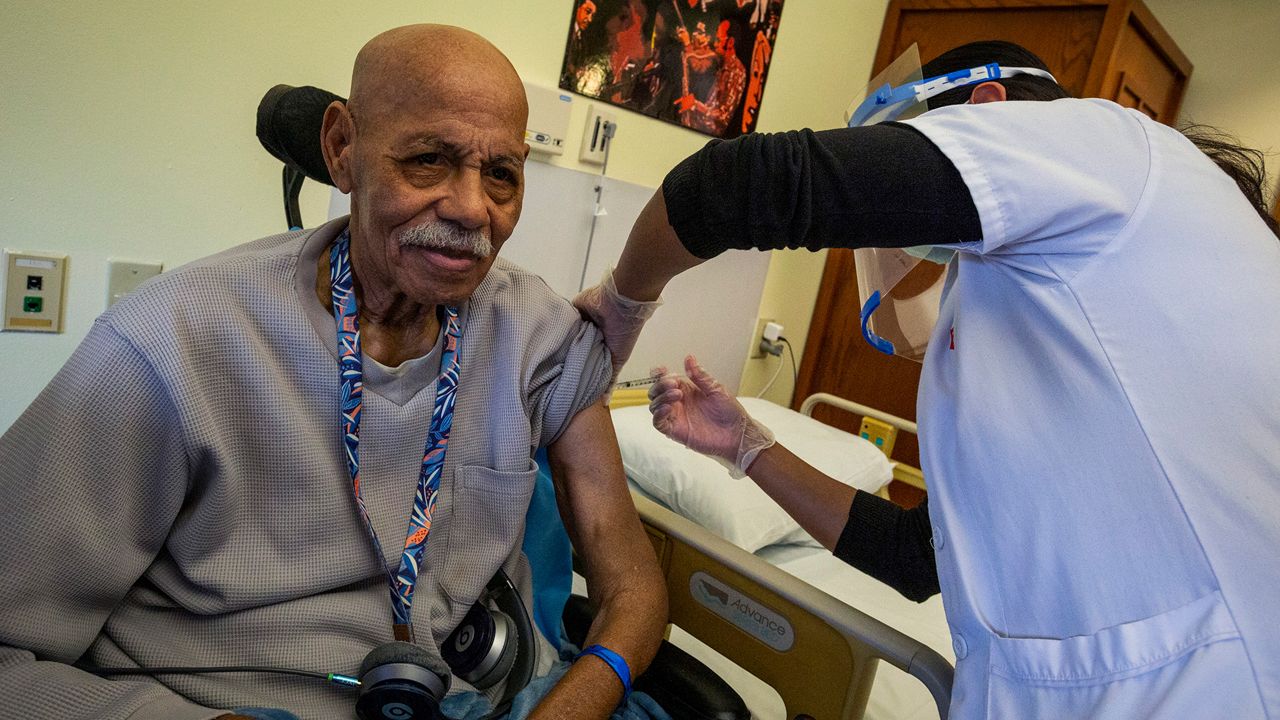COLUMBUS, Ohio — Some Americans are receiving fourth COVID-19 vaccines, but the Centers for Disease Control and Prevention does not have any data available regarding how many people have gotten second booster shots.
What You Need To Know
- It's unclear how many Americans have gotten fourth vaccines
- Second boosters are approved for everyone 50 and older in the U.S.
- Some patients who are immunocompromised can get fifth shots
The CDC reports there has been a recent increase in vaccinations overall in the U.S., spokesperson Scott Pauley said.
“CDC is working to update its booster dose metrics on COVID-19 Data Tracker to accommodate updated booster dose recommendations. At this time, we cannot confirm that the uptick in vaccinations is due to second booster doses,” Pauley said.
Infectious disease expert Dr. Robert Bonomo, associate chief of staff for academic affairs at the Louis Stokes Cleveland VA Medical Center, said they’ve seen high uptake from their veteran patients.
“Surprisingly, there was a lot of interest in getting the second booster, and our patient population averages between 65 and 67, at least in our VA, and a lot of them have some immunocompromising,” he said. “I know the first day that we opened up our doors for the second boost, at least 100 patients came in, if not more so."
Each vaccine provider should be tracking how many people have gotten second boosters, even if that data isn’t being posted on state or federal dashboards at this time, Bonomo said.
He encourages patients to talk to their doctors about whether the second booster is appropriate for them.
Bonomo also said it is reasonable if someone decides to wait to get their second booster until a time when COVID-19 cases are higher in the U.S.
“If one wanted to wait till another time, there's nothing wrong with that strategy either,” he said. “There are some people who are at higher risk and because of the nature of their particular situation or their living circumstances, it may be more advisable to take a vaccine, to take the boost now.”
Americans ages 50 and older can get second boosters four months after their first boosters, which would be a fourth vaccine shot for most mRNA vaccine recipients. For those who started with the one-shot Johnson & Johnson primary series, the second boost is the third shot. The second boosters are also available to certain younger Americans who are immunocompromised.
Some people who are immunocompromised can get a fifth vaccine because their third shots were considered “additional doses,” not boosters.
In Springfield, Ohio, Clark County Health Commissioner Charles Patterson said clinics have been busy recently amid strong demand for second boosters.
“Vaccines are going up. We're quite busy in the clinics,” he said during a COVID-19 update on Friday. “The second booster doses for our elderly and our immunocompromised have been going very well.”
Patterson said the patients getting second boosters are experiencing similar side effects as with earlier vaccine doses.
“Most of the clients that I've talked to have continued to have great experiences in going in and getting those boosters, similar side effects, similar reactions that they've had in the past, but knowing that it's better to have a side effect from a vaccine than it is to end up in the hospital or worse,” he said.
Serious side effects are rare, according to officials. Milder side effects may include injection site pain, fatigue, nausea or fever.
Infectious disease expert Dr. Keith Armitage, with University Hospitals in Cleveland, said in a video message Friday that he recommends the second boosters for everybody 65 and older and for people 50 and older who are at high-risk because of a condition, such as diabetes, hypertension or obesity.
“There's several recent papers that show that getting a second booster, if it has been four months since your first booster, getting a second booster decreases your risk of hospitalizations and deaths. It isn't as effective at preventing mild infection, but in high-risk patients, it clearly prevents adverse outcomes like hospitalizations or deaths,” he said.
On Sunday, Dr. Ashish Jha, the White House’s COVID-19 response coordinator, discussed the second booster in an interview with NBC News, emphasizing first that every adult should get a third shot.
“On the second booster, the data out of Israel is pretty compelling that people over 60, who got a second booster after four months after their first booster, saw not just a reduction in infections, but a reduction in deaths, so I think that's what really prompted both FDA and CDC,” he said.
Asked why the federal government expanded the eligibility to adults 50 and older instead of just for 60 and above, Jha said it’s about giving high-risk Americans the option.
“The Israeli data is 60 and above. There are a lot of people in the 50s, especially if you have chronic disease, who are at high risk. So in my mind as I read the evidence, people over 60 I think should be getting that booster. Again, that evidence is pretty compelling. Fifty to 59, you're certainly eligible. It depends on your risk profile. That's a place where I think it's really important to talk to your doctor,” he said.
The CDC and the FDA continue to study if and when to expand the eligibility for second boosters, officials said.
The CDC’s Advisory Committee on Immunization Practices, a panel of outside scientific advisers, is scheduled to meet Wednesday for discussions on the boosters and a possible recommendation vote.
The meeting comes two weeks after the FDA’s advisory panel held a meeting where members discussed the second boosters, but did not issue a formal recommendation. The CDC and FDA expanded the eligibility without recommendations from either of the outside panels.



